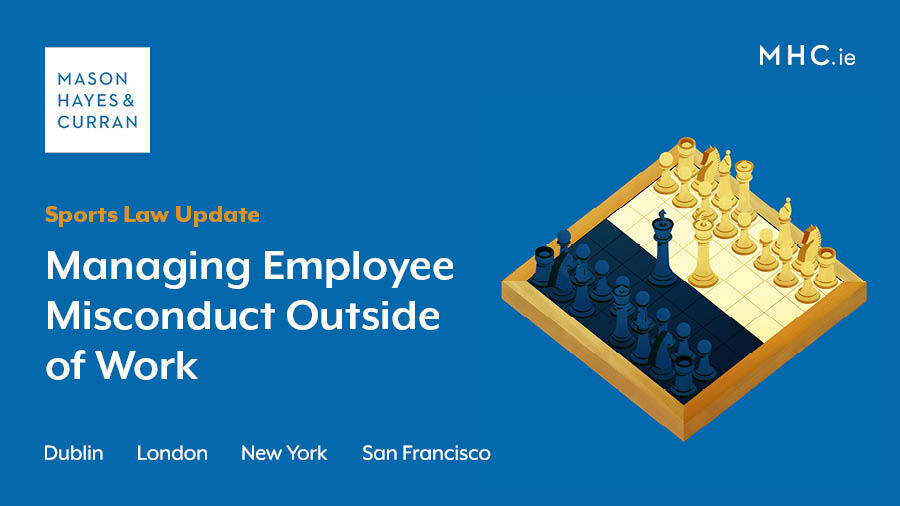Managing Employee Misconduct Outside of Work
The dismissal of Referee David Coote

David Coote, a Premier League referee, was dismissed from his position in November last year following an investigation into videos which emerged of him on social media. These videos appeared to call his professional conduct into question. Our Sports Law team examines how conduct outside of the workplace may ultimately lead to dismissal.
What you need to know
- Conduct outside of the workplace refers to employees' actions and behaviour when they are not on duty or at their place of employment.
- David Coote, a Premier League referee, was dismissed from his employment in November 2024 after videos emerged on social media in which he appeared to make negative comments about Liverpool Football Club and their former manager, Jürgen Klopp.
- Another video came to light appearing to show Coote snorting a white powder while reportedly working at Euro 2024.
- Coote’s employer investigated his conduct and found his actions to be in serious breach of the provisions of his contract of employment. Following this, his position was deemed untenable.
- As with any disciplinary sanction, it is necessary for employers to comply with fair procedures. However, it is also important to ensure that any alleged conduct outside of the workplace has a sufficient connection to the business of the employer.
Introduction
Managing conduct outside of the workplace can be a difficult area for an employer to navigate. The recent case of David Coote and the termination of his employment as a Premier League referee serves as a timely reminder. Certain actions outside the workplace may be considered misconduct and lead to a breakdown in the relationship of trust and confidence between employer and employee. As with any potential disciplinary issue, particular care is needed to ensure fair procedures are followed and a full hearing is afforded to the employee. If, following fair procedures, the employer has reasonable grounds to believe the employee is guilty of serious misconduct, the dismissal is likely to be deemed fair. The serious misconduct which may arise outside of the workplace may come in the form of a criminal conviction or may simply be related to the employee’s social media use outside of work.
Irish case law
In Ireland, case law has focused on whether the out-of-work conduct of the employee impacted adversely or could impact adversely on the employer’s business. It examines whether such conduct would render the employee unsuitable and/or be capable of damaging the employer's reputation. To successfully ground a disciplinary sanction, employers need to be able to:
- Show the connection between the alleged misconduct and the damage to employer’s business activities, reputational or otherwise. Most commonly cases of this nature involve the potential of some reputational damage.
- Ensure that employee was aware of any relevant code of conduct or policy on which the employer may wish to rely.
- Prove that the disciplinary sanction imposed is fair, reasonable and proportionate to the misconduct alleged.
The following rule in approaching criminal conduct outside of the workplace has been developed and is outlined in Redmond on Dismissal Law (edited by Desmond Ryan):
“As a general rule, the employer has no right to institute disciplinary proceedings unless it can be demonstrated that it has some legitimate interest in the conduct of the employee. An interest would normally exist where there is some nexus between the employee's conduct and the employer's business.”
Decision of the PGMOL
In the case of David Coote, the alleged misconduct, appeared to have a close connection to his duties as a Premier League referee. The conduct in question related to comments he made on social media about a Premier League team and its management. His employer, Professional Game Match Officials Ltd (PGMOL), following an investigation into the conduct at issue, released the below statement:
"Following the conclusion of a thorough investigation into Coote's conduct, his employment with PGMOL has been terminated today with immediate effect. Coote’s actions were found to be in serious breach of the provisions of his employment contract, with his position deemed untenable.”
During the investigation, Mr Coote’s employer stated that they would adopt a zero-tolerance approach to any breach of their integrity code of conduct, which is signed by all match officials on an annual basis.
Key takeaways for employers
An employer may discipline an employee if conduct falls below the expected standards. If the conduct relates to matters outside of the workplace, there needs to be some connection between the conduct in question and the business interests of the employer.
Employers should ensure that they have a clear policy that outlines expectations for behaviour both within and outside of the workplace.
Employers should also consider introducing a social media policy that addresses appropriate online behaviour. The policy should include guideline on posting content related to the company, regardless of whether that content is posted during normal working hours or on a personal or work account. Employees need to be made aware of this policy and appropriate training should be provided.
As with all decisions to discipline employees, the employer must be able to justify the reasonableness of that decision. In any event, the WRC will likely analyse the fairness and proportionality of any contested decision.
For more information and expert advice around disciplinary matters and ensuring fair procedures throughout your investigations, please reach out to a member of our Employment Law & Benefits or Sports Law teams.
People also ask
Can an employer use conduct outside of the workplace to discipline an employee? |
To successfully ground a disciplinary sanction, employers need to be able to:
|
The content of this article is provided for information purposes only and does not constitute legal or other advice.
Share this:



